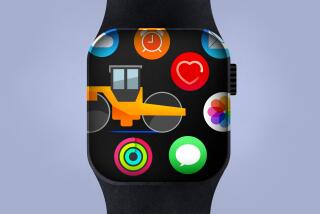The Cutting Edge: COMPUTING / TECHNOLOGY / INNOVATION : Apple Says It’s Not for Sale--to Sun or Anyone
CUPERTINO, Calif. — Apple Computer Inc. Chairman Armas C. “Mike” Markkula Jr., seeking to quell speculation that the troubled computer maker is about to be sold to Sun Microsystems Inc. for a bargain-basement price, asserted Tuesday that the company is “not for sale.”
Speaking at a news conference after a contentious meeting of Apple shareholders at the company’s headquarters here, Markkula also said beleaguered Chief Executive Michael Spindler enjoys “the full support of the board.”
But Wall Street was betting that a deal with Sun--which the Wall Street Journal reported Tuesday as being “imminent”--could indeed be in the works. Apple stock, which has been falling in recent days, rose $1.125 to close at $31.625. Sun was down $4.4375 at $44.125 as investors fretted that an acquisition could hurt earnings growth. Both stocks trade on Nasdaq.
Markkula declined to comment on the buyout report, which had Sun buying Apple for about $33 per share in Sun stock, roughly $4 billion. At Sun, chief technology officer Eric Schmidt would not comment directly but said: “From time to time a major computer company gets into the kind of difficulties that Apple’s experiencing and something’s got to happen. I’m sure Apple is evaluating its options right now.”
Rumors of a possible buyout have swirled around Apple for much of the last year, with Hewlett-Packard, IBM and Oracle frequently mentioned as possible suitors, along with Sun. Many analysts say Apple and Sun would be an ideal fit--and the issue has gained new urgency in recent weeks as Apple continues to falter. The company said last week that it lost $69 million in the final quarter of 1995 and that it expects further losses in the current quarter.
Perhaps even more damaging was the unveiling of a restructuring plan that included laying off 1,300 people but that most analysts regard as a half-measure. Spindler tried to explain the new strategy to shareholders Tuesday, but it remains unclear: He maintained that Apple will not pull out of the low-margin consumer market, as many had reported, but at the same time he said the company will target more profitable arenas.
Spindler engaged in a couple of tense exchanges with shareholders and later with reporters, who both cited his failure to take responsibility for Apple’s woes. “What do you want from me? A mea culpa?” an exasperated Spindler said at one point. “Of course I’m responsible.”
One shareholder called Apple’s layoff of just 8% of its work force “wimpy.”
Others complained that Apple has squandered its once-formidable technology lead over arch-nemesis Microsoft Corp. And some shareholders called for Spindler to be fired.
Still, of the four Apple directors up for reelection--including Markkula--none received less than 81% of the vote. With many institutional investors having abandoned Apple when the company’s stock went into a free fall, it is unlikely that these smaller shareholders have the clout to make the board act.
Even so, Apple’s board may find an acquisition by Sun palatable, especially since its options seem to have narrowed. IBM and Hewlett-Packard appear to no longer be interested, and others such as Oracle are likely to gut much of the company to separate its valuable software from its less highly prized software.
And Japanese companies--Sony was said to be interested at one time--appear wary of acquiring American companies after disastrous purchases of Hollywood studios and technology concerns.
Analysts greeted the possibility of a Sun buyout favorably.
A Sun acquisition would fix many of Apple’s problems. Sun would provide Apple--which has seen a number of its top managers leave during the last year--with a strong management team and one that several years ago navigated that company out of a crisis similar to the one Apple is now experiencing.
And Sun’s business--selling scientific and engineering workstations and servers that orchestrate computer networks--has little overlap with Apple’s, which is directed at consumers and niche markets such as desktop publishing. Sun has long sought to broaden its base to traditional PC users, mostly without success.
Furthermore, Sun has carved out a leadership position in supplying hardware and software for the Internet. Its Internet servers are the market leaders, and a programming language called Java is expected to play a big role in Internet software development.
Although Apple’s Internet strategy has been erratic, its hardware and software are considered to be very well-suited to the Net.
With its strong technology, loyal base of 22 million users and Internet potential, Apple would provide Sun Chief Executive Scott McNealy a weapon to take on his rival, Microsoft Chairman Bill Gates. “It’s important for the world order that Apple continue to exist as an alternative platform,” said Sun’s Schmidt.
McNealy has made no secret of his contempt for Microsoft and its power over the PC business. And with the Internet as a brand-new playing field, Sun now has a chance to make further inroads against the software giant.
“It’s his shot at becoming king,” said Michael Gartenberg, a software analyst at Stamford, Conn.-based researcher Gartner Group. “He could offer a credible alternative to Microsoft.”
Still, an acquisition the size of Apple could be a huge risk for Sun. Acquisitions often cause a company to lose focus, and Apple’s problems are particularly thorny. And not only would Sun have to merge two teams, it would also have to combine two very different product lines.






